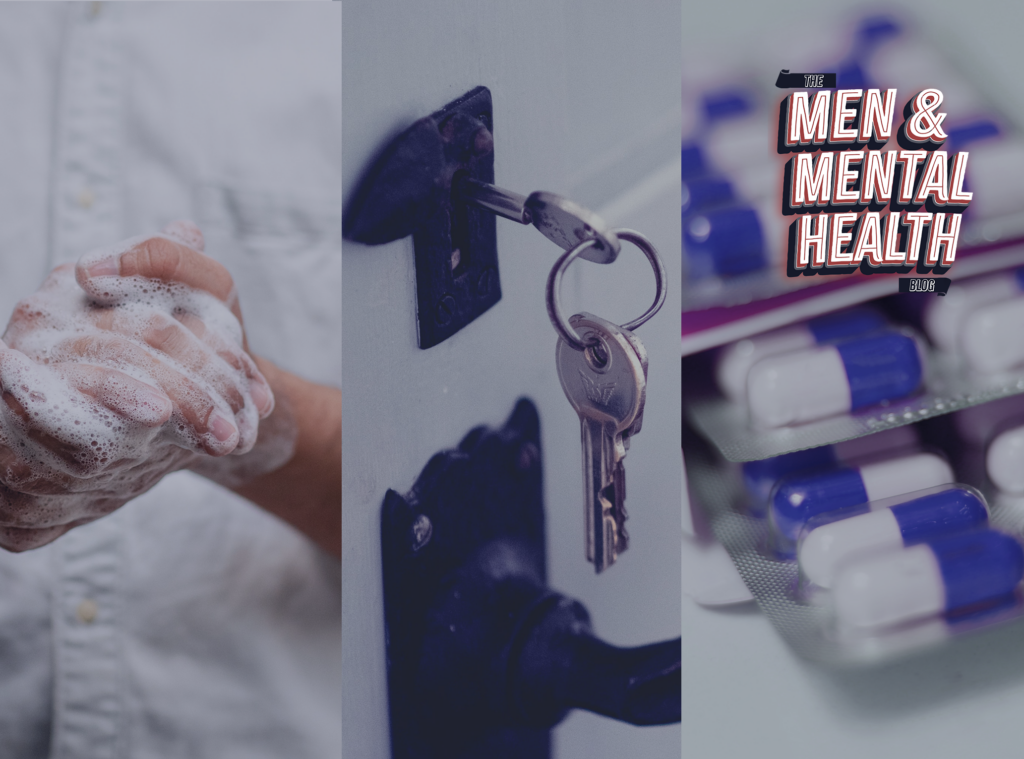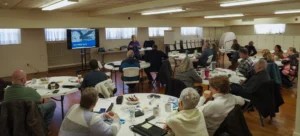Let me tell you about my brain.
Imagine thinking about all the things you have to do one day at work. While you are thinking about those things, a constant song plays in your head. While this song is only in your head, if you sing a line wrong, you must start over again, until you get the line perfect. All this occurs while you also worry about an embarrassing interaction you had with a teacher 20 years ago.
Or here’s something about my brain that happens occasionally between me and my wife. I am sitting on the couch watching a movie with her, and I zone out. Twenty minutes go by, and I realize I am staring at my fingernail, dwelling on the lines and complexities of my nail. I am thinking about a negative scenario that has not happened, and will probably never happen. Yet this consumes me so much I completely zone out the movie and the fact that my wife has been trying to get my attention for the last thirty seconds.
My name is Drew and I was diagnosed with obsessive compulsive disorder (OCD) when I was ten years old. When I was going through my teenage years, my OCD looked a lot different than it does now. I had intrusive, dark thoughts I could not control—thoughts that scared me and made me question my sanity. To relieve these thoughts, I used compulsions to make me feel better.
If you have read anything about OCD, I was a classic handwasher. I lived with a lot of shame and guilt, and my young brain associated hand washing with the perfect way to get rid of guilt and shame. I washed my hands hundreds of times a day, with scalding hot water and soap. There was no algorithm for when it was enough. I washed them until my brain told me “Yup, you’re good.” This could be once, or it could be forty minutes later. My hands were dry, cracked and bleeding most of the time. I also picked at my nails whenever I was anxious, and I was always anxious.
The hand washing was bad enough, but I was also a “checker.” To me, the doors were never locked. I had to check to make sure they were. Even if I had just checked them, my mind questioned, “But what if you didn’t?”
I had obsessive thoughts all the time, and it felt as if my brain was so crowded, one false step, one miscalculated action, would cause everything to fall apart.
Weirdly, this became a superpower of mine. I was always aware of others, how they perceived me and those around them. I was hyper-vigilant—alert and aware of everything going on around me. It was exhausting, but I almost always knew what was going on or what was expected of me in any situation.
I had, and still have, very supportive parents who were aware early on that something was going on in my brain, and I needed help. I saw a psychiatrist, had several sessions of counseling, and was on medication for awhile. My mind became very tough, and because of my personality, I was able to develop crazy, rigid boundaries and mechanisms in my brain that protected me from my OCD. I spent years working on myself, and by the time I was nineteen, I was in a very good space and had things well under control.
However, my early years with OCD are not where I want to focus. I have painted a picture of them for you with the hope you will see that I suffered a great deal, learned tools, and thought I was good to go.
I spent years in junior college, snowboarding, messing around and having a great time. I joined the Navy at 23 to turn my life around and find direction. I spent four years in the Navy, working hard, learning how to be an adult and realizing the path I wanted for myself.
During this time, my OCD was under control. I had not been on medication since I was about 16 or 17, and at this point, I thought I was untouchable. I had been thrown into a blazing inferno and come out the other side without a single burn. Or so I thought.
I took care of myself, but not in the ways I used to. I was so busy I didn’t recognize the neglect I was putting myself through by not dealing with my mental health. It was a slow burn and I had many great and wonderful things to keep me occupied—marriage, relocating to the Midwest, and finishing an undergraduate degree following my four-year stint with the Navy.
I had my first panic attack when I was 28, just a year into the two and a half years I needed to get my degree. It was the most bizarre thing that ever happened, and I had never felt anything like it. I was talking to a professor I had talked to a thousand times before, and my face started getting hot. My heart rate increased. I had panicky thoughts that she was going to recognize I was not in control of myself. This thought is what brought about the panic, and then increased it when I realized there was not an actual thing to panic about, nothing I could control. This attack lasted about ten minutes and then didn’t happen again for a while.
Two months later it happened again and I wasn’t ready for it. I am not one to be caught by surprise more than twice, so when it happened a third time several months after that, I was ready. The third time was much sooner than I would have liked, and although I was more prepared, I also realized something was happening to me that I needed to get under control.
When the third panic attack occurred, I had graduated with my bachelor’s degree and was in graduate school to become a counselor. I cutback my caffeine intake, taking CBD oil religiously (I thought it would calm me down), and exercising as much as I could.
It did not matter. I was nervous all the time. Not only that, I realized this was just a mature form of my OCD, because I began to have irrational thoughts again. The panic was coming from those irrational thoughts. I did everything I could to control it.
I had beat it once before, right? I thought I could do it again.
But I couldn’t.
I was 31-years-old, a brand new father, working full-time as a student counselor while also going to school full time. I had one semester left in graduate school, but I could not control my emotions. I felt like I wanted to cry all the time, but I could not tell you why. Random things made me nervous for no rhyme or reason. One time I rescheduled a client ten minutes before their session because I started panicking, (couldn’t tell you why) and realized there was no way I was going to be able to help them in their own mental health journey, when I couldn’t even control mine.
My wife was vaguely aware I was not doing okay, but no one knew the extent to which I was suffering. I was a man. I had this handled. Not only was I a man, but I was also a man studying counseling. How could I admit that I did not have my emotions handled when I was studying to help other people get their emotions and mental health in check?
I suffered in silence. I was so torn apart inside. I have never felt that alone or helpless.
I could not go on the way I was going anymore. Something had to change, and I reached a low point where I had to ask for help. I wanted to leave school, stop what I was doing, and abandon everything I had worked on. If you know me, you know that is an insane thing to have come from my mouth, but that is the headspace I was in.
So, what did I do?
I started talking. I had a conversation with my wife and really let her know what was going on in my head and how powerless and vulnerable I felt. I talked to my supervisor at my internship who let me know it was normal for interns to experience severe stress, and I was to let them know if I needed anything.
The last thing I did was see a therapist. This therapist was not a god, miracle worker, or even an extremely experienced therapist, but they were who I needed in that moment. The power wasn’t in what they told me. I probably already knew everything they would say or did say. The power was in speaking out loud the fears, doubts, and uncertainty in my mind, and allowing someone else to sit in that uncomfortableness with me. I hit the reset button. I allowed myself to know I did not have things handled, that I needed help to reassess how I was taking care of myself. I went to my doctor and we both agreed I should get back on a low dose of some medicine.
It was not an overnight change. I was not instantly better and ready to tackle whatever came at me. It took time. I had to heal and build back the defenses and tools I had once carried but had let slide.
I am proud to say that I am doing very well today, but I pay great attention to my self-care. I love helping people and supporting those in need, but to do that effectively I have to make sure I am taking care of myself.
As we discuss men and mental health, please use my story in any way that is helpful. I should have asked for help sooner, but I didn’t. I did ask for help, but I was fortunate to be surrounded by mental health professionals. I had a background with mental illness, but I never saw it coming.
My story has so many complexities, but I hope you will see that at the end of the day, we are all the same. We desire connection and distance, vulnerability and strength. We are a people of mixed messages, yet one thing is clear, help starts when you allow yourself to talk about it.




